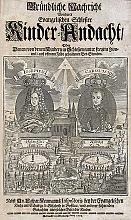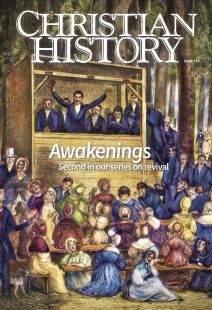Defining revival

[Above: Michael J. McClymond, personal photo]
“Revival,” “outpouring,” “renewal,” “awakening”—we use these terms frequently throughout our revival-focused issues. How do we define them? Do these words carry different shades of meaning? Issue advisor Michael J. McClymond, professor of modern Christianity at St. Louis University, offers a helpful history for understanding these words and the movements they represent.
The English word “revival,” together with its foreign equivalents (Ger. Erweckung, Fr. réveil, Sp. avivamiento, Chin. fen xing, Kor. bu hung), in general usage denotes a period of time when a Christian community undergoes revitalization. But terminology has varied over time. To describe the unusual religious phenomena occurring in the American colonies during the 1740s, people at that time wrote of a “concern” or “interest” among the people, or of a “work” that God was doing, and the term “revival” was often omitted. The term “Great Awakening” did not become standardized until decades after the 1740s. It may be better, therefore, to address this question of definition by emphasizing not the differing terms, such as “revival,” “awakening,” and so on, but the common phenomena associated with these terms.
Diverse, emotional, controversial
Revival accounts from different eras, geographical regions, and ethnic groups show common themes. Participants
in revivals speak of a vivid sense of spiritual things, great joy and faith, deep sorrow over sin, a passionate desire to evangelize others, and heightened feelings of love for God and fellow humanity. In times of revival, people often crowd into available buildings for religious services, filling them beyond capacity. The services may last from morning until midnight or later. News of a revival usually travels rapidly, and sometimes the reports of revival—in person, print, or broadcast and social media—touch off new revivals in distant localities.
During a revival clergy and other Christian workers may be overwhelmed with requests for their services. Sometimes people openly confess their sins in public settings. Another mark of revival is generosity—individuals are willing to give their time, money, or resources to support the work of the revival. Revivals are usually controversial, with opponents and proponents who vehemently criticize one another. Opposition typically arises in the wake of revival gatherings. Often there are bodily manifestations in revivals, such as falling down, rolling on the ground, involuntary muscle movements, laughing or shouting, and spiritual dancing. Another common feature is an assertion of signs and wonders, such as the healing of the sick, prophecies, visions or dreams revealing secret knowledge, deliverance or exorcism from the power of Satan and the demonic, and speaking in tongues.
Waking to the gate of heaven
Such terms as “revival,” “outpouring,” “renewal,” and “awakening” do not necessarily refer to different things but may describe the same event from different angles. We might ascribe the “revival” of earlier Christian faith and fervor to the “outpouring” of the Holy Spirit, which brings a “renewal” of life in the church and an “awakening” to the reality of God among believers and nonbelievers alike.
When even church ministers and committed laypeople remain in a spiritually comatose state, a revival causes them—and many others—to become profoundly aware of God’s presence and of who God is. God does not withdraw during the ordinary seasons of church life. In a revival believers wake up to the God who has been there all along, like the biblical Jacob, who awoke from his dream at Bethel wherein he saw the angels, and said: “‘Surely the Lord is in this place, and I did not know it.’ And he was afraid and said, ‘How awesome is this place! This is none other than the house of God, and this is the gate of heaven’” (Gen. 28:16–17, ESV).
Richard Owen Roberts suggested an easy-to-remember, one-word definition of “revival”: God.
Yet one person alone with God is not a revival. To have a revival, there must be a group experience. Revivals are corporate events. To call a religious gathering a revival is to suggest that participants have undergone an intensification of experience. Multitudes gathered for a religious service do not necessarily imply a revival. A gathering of a hundred might offer a better picture of revival than an assembly of a hundred thousand. What distinguishes a revival is a pronounced deepening of religious feeling and expression. CH
By Michael J. McClymond
[Christian History originally published this article in Christian History Issue #151 in 2024]
Michael J. McClymond is professor of modern Christianity at St. Louis UniversityNext articles
“A church rightly reformed . . .”
Puritans pursued relentless renewal in the Elizabethan Church
Scott McGinnis“Viva! Viva! Gesù!”
In the wake of Protestant Reformation, Catholic reform rekindled love for Christ within the Catholic church
Shaun BlanchardRecovering “true Christianity”
Pietism stood at the forefront of renewal in the seventeenth and eighteenth centuries
J. Steven O’Malley







